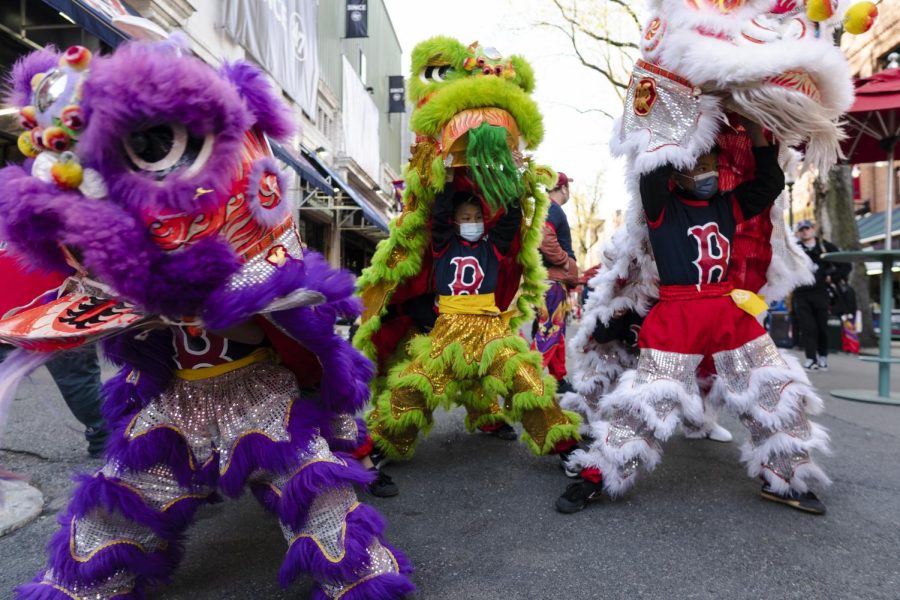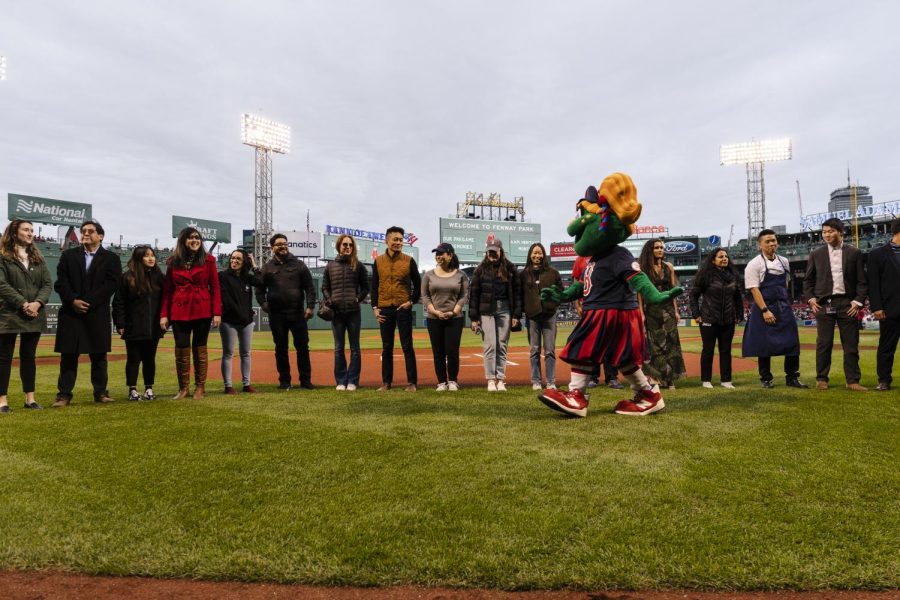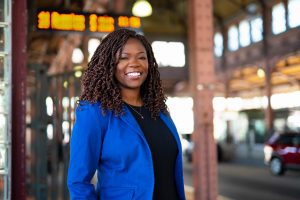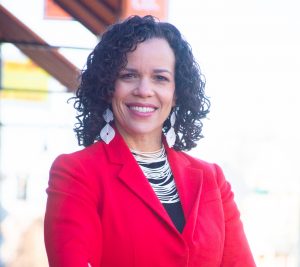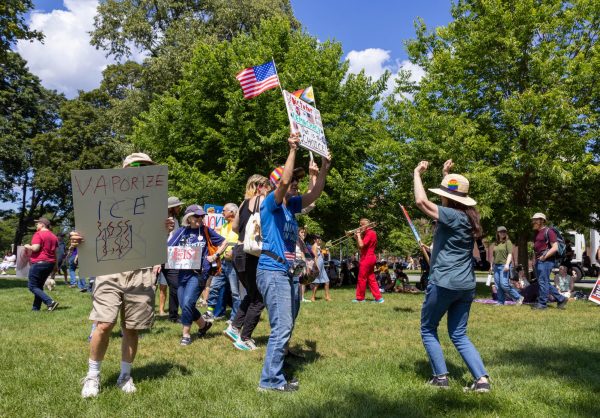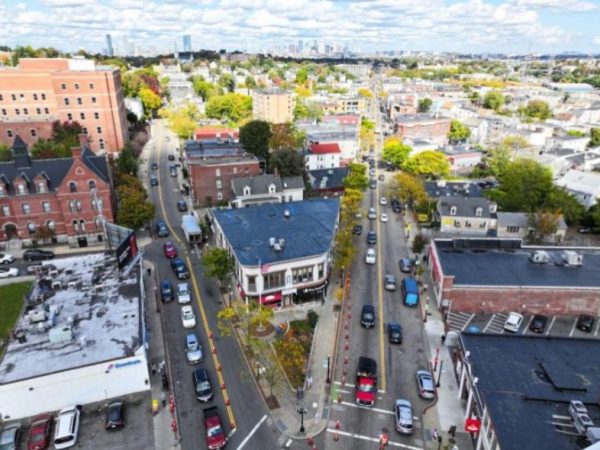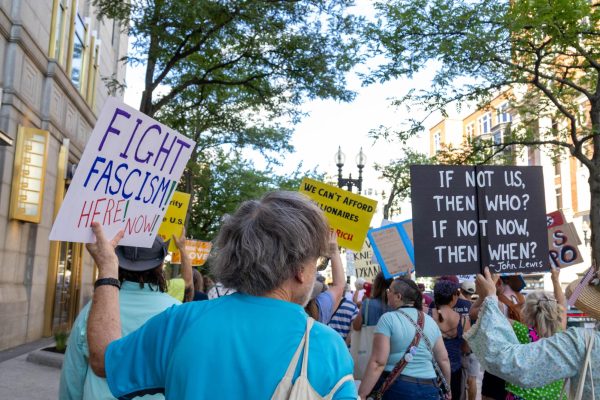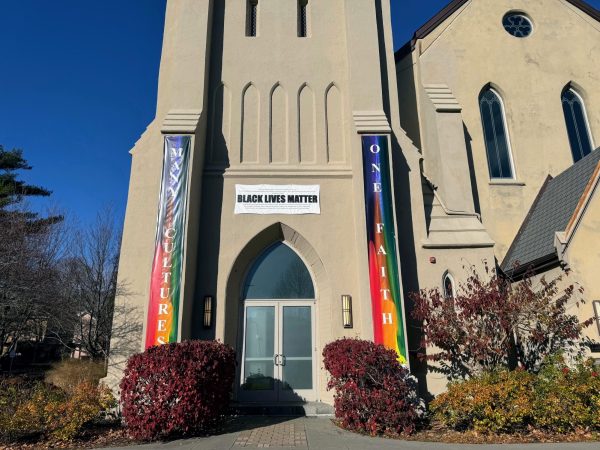Red Sox kick off AAPI Heritage Month at Fenway Park
Photo: Sophie Park
Wah Lum Kung Fu & Tai Chi Academy students perform at Fenway Park in honor of AAPI Heritage Month in Boston, MA on May, 3, 2022.
On Tuesday evening, Jersey Street was filled with Red Sox fans geared up for a game against the Los Angeles Angels. Amid the crowd’s noise, clamoring for pictures of the historic ballpark and sizzling hot dogs, were thundering sounds of the tanggu drum and clanging cymbals as Chinese lion dancers put on a show.
For their first home game in May, Asian American and Pacific Islander (AAPI) Heritage Month, the Red Sox worked with Quincy Asian Resources, Inc (QARI) as their community partner to bring a cultural parade to life. QARI is a nonprofit based in Quincy, Mass. that empowers Asians and immigrants.
The lineup of events also included Japanese taiko drumming and a Polynesian dance and music performance spread throughout Fenway Park. Before the first pitch, spectators indulged in pan-Asian snacks, such as summer rolls, tofu satay and miso eggplant buns, while watching the performances.
“I think making sure that Fenway Park is a place that is welcoming to all and is representative of the diverse community in Boston [that the city] gets a lot of credit for. We want to make sure that we’re reflecting that,” Kurt Zwald, director of research, intelligence and analytics at Red Sox, said.
Zwald is one of the 12 Red Sox members of the Social Justice, Equity & Inclusion Committee (SJAC) formed in 2020. The internal team was created to promote diversity, equity and inclusion (DEI) efforts for all staff members, from the ballpark to the ticketing office. Zwald acknowledges the crowd in Fenway Park is often white-dominant, so they implemented initiatives to further their work in DEI.
The 2021 Atlanta spa shootings sparked a discourse on AAPI heritage and the growth of anti-Asian hate throughout the country. Sonya Bhabhalia, Red Sox’s government affairs and corporate communications specialist, said she hoped Fenway Park could become a place for the AAPI community to share their culture.
“We knew that there was a lot of discussion around Stop Asian Hate, especially in Boston. We have a huge Chinatown community,” Bhabhalia said. “The conversation [on] ‘how do we use our platform to amplify that message in different ways to reach out to the Asian community’ came out of those early conversations.”
As co-captain of an AAPI employee resource group formed by the SJAC in 2021, Bhabhalia has been actively working with her colleagues to boost an initiative in educating Red Sox staff on AAPI culture.
“It’s really important in a baseball organization, where you have the front office doing your marketing, your community relations and your ticketing [to] be able to connect with people on the sports side and on-field,” Bhabhalia said.
Zwald and Bhabhalia’s teams consulted with Rep. Tackey Chan of the Second Norfolk district to deeply understand the stories and struggles of AAPI individuals across Massachusetts. Zwald said planning the Sox’s first AAPI heritage event with community leaders pushed him out of his comfort zone to think about AAPI representation critically.
“I think we will also want it to be more celebratory in nature of the AAPI culture,” Zwald said. “We wanted to have more activations and ways to showcase different cultures.”
QARI CEO and President Philip Chong was invited for a first-pitch event in May 2021 and returned to the field this year to collaborate with the Sox in creating the AAPI heritage event program. As a team, they also designed a Red Sox AAPI heritage t-shirt featuring “Boston” translated to various languages.
“I think for an institution like [the] Red Sox that wants to work with community organizations, like QARI, [this] is a great first step to show that we are taking that initiative together,” Chong said. “Throughout the planning process, we were very respected. Honestly, [the Sox] bent backward to really help us make it work.”
The AAPI heritage event was made possible through Chong’s partnership with ShinDaiko, a Japanese taiko drumming ensemble in Boston, and Wah Lum Kung Fu & Tai Chi Academy, a Malden-based martial arts school.
Chong underscored that the term AAPI is not merely a monolith but an umbrella term covering a range of aspects of one’s identity.
“There’s a very diverse community in the Asian American Pacific Islander community … there’s so many very diverse different groups in terms of language, culture, food, activities and perceptions, styles, all those other things,” Chong said.
He also hopes to spark the curiosity of attendees through the event and for them to go beyond scratching the surface to learn about AAPI identities, cultures and differences.
“I want people to embrace [AAPI heritage] and as a starting point to be educated,” Chong said. “Through the game, we want them to remember that the month of May is the AAPI month celebration as a first point. And then hope that it will [be of great] interest [for attendees] to learn more.”
May was designated to celebrate AAPI heritage and commemorate two key dates: the arrival of the first Japanese people to the U.S. on May 7, 1843, and the completion of the first transcontinental railroad in the U.S. that was largely constructed by Chinese laborers on May 10, 1869.
For Chong, Boston is a melting pot. Boston is a magnet for international students, which comprise 28% of the city’s residents, according to Census data between 2016-2020.
“Boston is a very safe, diverse and very nurturing city,” Chong said. “We hope that [Boston] becomes a role model or success story, so other places will be eager to do more stuff like [the Sox’s AAPI heritage event].”
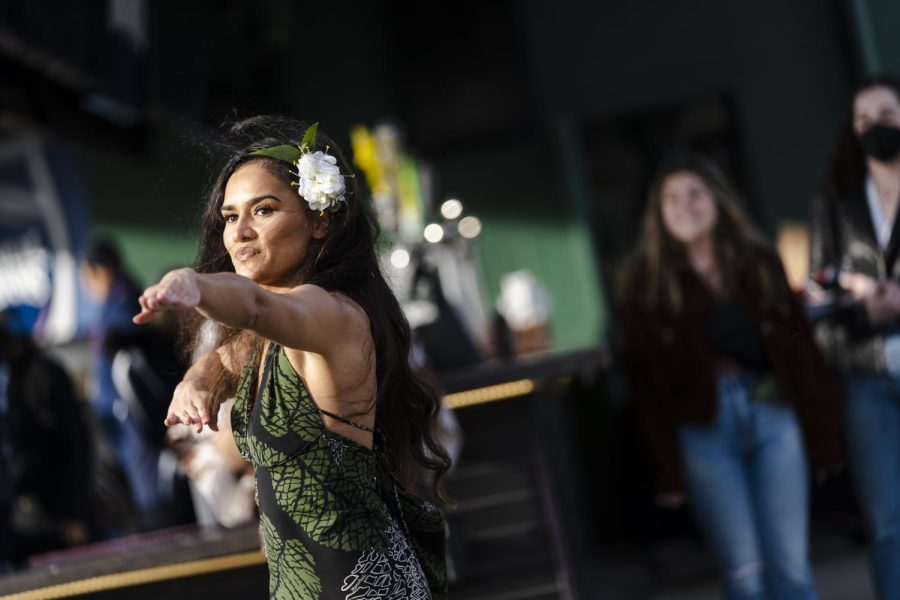
Tia Midro, a health science and psychology student at Northeastern University, led a Polynesian dance performance with students and alumna from Massachusetts Institute of Technology and Harvard University. She said having the platform to showcase her culture to a wide audience was “surreal.”
“Coming from a Hawaiian background, it’s very important for me to support and represent native histories and represent [them] accurately, thoughtfully and respectfully,” Midro said. “That’s my goal: sharing the story and language of Hawaiian culture.”
Midro’s journey in finding and building a community was a “scary step in my life” — she moved to Boston from Kapolei, Hawaii solo for higher education. She eventually found her cultural roots with Polynesians and Pacific Islanders who also live in the Greater Boston area, and said she felt that her intersectional identity was represented during the event.
“Being from Hawaii, like most people from Hawaii, I’m mixed with a bunch of different ethnicities,” Midro said. “I am mostly Hawaiian, but I also have Asian descent. How [the AAPI event] represented both parts of my identity just really hit home [for] me.”
Sophie Park contributed photos to this piece. Park is a Korean American documentary photographer based in Cambridge, MA. You can visit her website at www.sophieupark.com


